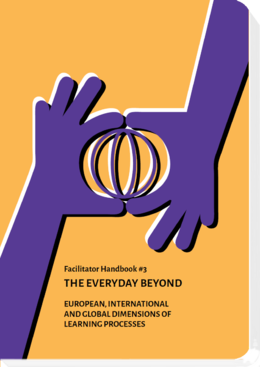For education around aspects of the constantly developing, interconnected and globalized world of the 21st century we propose a competency model for an interconnected world.[1]
"Hardly any of the issues we work on in education can be fully understood without addressing the global connections behind them."
The editors of Competendo's handbook: The Everyday Beyond
Sensitivity and reflection
- Understanding the individual’s role in the European, international and global system
- Understanding the global power issues we are surrounded by
- Understanding and reflecting on assumptions, beliefs and role models and the concepts behind them (biases)
Building cognitive knowledge on certain European, international and global issues
- Being able to research materials about global issues, then working within the framework of that information to develop it further
Critical and systemic thinking
- Understanding the role, rights and duties of the individual in the society
- Understanding the role of human rights, development, interculturality and environment in systems
- Understanding power relations in the systems one participates in, especially regarding global issues and how those can change depending on the specific situation
Understanding global connectedness
- Understanding privileges and power biases in global issues
- Developing awareness of Euro- and ethnocentrism and its consequences
- Being able to see and research the global background and consequences of actions and products
Empathy and changing perspectives, appreciating diversity
- Being able to be empathic (even with “invisible” people connected only via procurement chains)
- Being able to consider and to respect different positions
- Being aware of different or shared values
- Reflecting on personal values and understanding other values without devaluing them
- Being able to show solidarity with less privileged persons
- Being able to be and stay globally open minded
- Being able to look for new perspectives and to integrate them in existing knowledge
Diversity-oriented communication
- Being able to communicate ideas with others who have different perspectives
- Understanding different communication styles and the influence of power in communication
- Being able to give and receive feedback in a culturally diverse environment, and being aware of shifting power relations depending on the situation and the communication partners
Coping with uncertainty
- Understanding the concept of identity in the context of global learning
- Being able to accept and deal with ambiguity
- Being able to broaden the perspective of personal identity and still feeling secure in it
- Being able to accept and deal with complexity
- Being able to accept the uncertainty of open situations
Taking responsibility
- Understanding personal responsibility for interaction with other humans and the environment
- Being aware of global responsibility as a consumer and citizen
- Being able to self-motivate to become active
Taking action
- Understanding basic planning tools
- Understanding basic methods of developing project and action ideas
- Being able to think in a problem solving oriented way and to estimate possible consequences of actions
- Being able to work successfully with others (in teams)
- Being able to reflect on and solve conflicts, which might have occurred because of different communication styles, values, interests and preferences, privileges and power, etc.
- Being able to motivate others to become active Outset: How global, international and european learning contributes to competency development
Examples for Frameworks tackling Civic Competences
References
- ↑ M. Haberl, J. Teynor, N. Zimmermann: The Everyday Beyond - European, International and Global Dimensions of Learning, Competendo Handbooks for Facilitators 2017
Mag.a Jana Teynor, MA
Coordinator für Education and Public Relations at Südwind Austria. Expert for Global Learning/Global Citizenship Education.
Matthias Haberl
Project manager for the Austrian development organisation Südwind, freelance trainer, facilitator and author of handbooks and on Competendo.
Nils-Eyk Zimmermann
Editor of Competendo. He writes and works on the topics: active citizenship, civil society, digital transformation, non-formal and lifelong learning, capacity building. Coordinator of European projects, in example DIGIT-AL Digital Transformation in Adult Learning for Active Citizenship, DARE network.
Blogs here: Blog: Civil Resilience.
Email: nils.zimmermann@dare-network.eu























